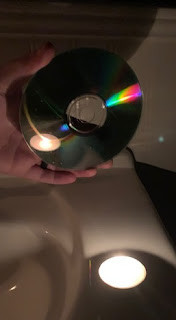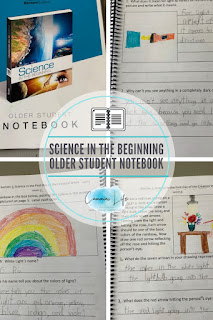Today we are going to take a closer look at the science components in our 1st Grade Elite Curriculum Kit from Timberdoodle, our Science in the Beginning Set. Our set includes the textbook itself, the Helps & Hints booklet and the lab kit.
This elementary science curriculum is recommended for ages 5-12 and is the first book in the Berean Science Series which teaches science chronologically (we have previously reviewed the 4th book in this series - Science in the Age of Reason). I have been using this science curriculum with E (3rd grade), F (1st Grade) and G (PreK) and it has been wonderful!
This series is Christian based and this book begins just as it infers - at the beginning with the six days of creation. If you do not want a curriculum with a Christian worldview, this would not be a good fit for you as students are consistently reminded of our Creator. I personally love this! Science in the Beginning contains 6 Units, one for each day of creation and each unit is broken into 15 lessons (90 total lessons). Students are introduced to an array of scientific topics including light, energy conservation, the properties of water and air, solar system, zoology, etc. This curriculum is very experiment heavy and the kids absolutely love this. The kids are so excited to do their science program every week and I cannot tell you how excited that makes me!
While the Helps & Hints booklet isn't necessary it is super helpful to have as it contains answers for the review exercises as well as hints for you to make checking, correcting and explaining easier - there are tests and test solutions for those who want to use them.
Because this curriculum is very hands-on, every lesson has some sort of activity, so having our prebuilt lab kit is super helpful! It contains most of the necessary lab supplies that you
may not have on hand at home like a blank CD, small mirror, magnifying glass, fluorescent spiral bulb, magnesium sulfate, 9-volt battery, cork, clay, cupric sulfate, iodine solution, pipette, etc. It does not have everything (you will need some common household items and food items) but I think it does a great job of having the harder to find supplies.
Because I am using this program with E, F and G I really appreciate that the lessons conclude with questions and activities for younger, older and oldest students. This works well with varied ages and is perfect for how we are using it.
I actually used some of my Doodle Dollars (a fabulous Timberdoodle perk 😉) to pick up a Science in the Beginning Student Notebook for Older Students for E to use. It is too much for F and G but is a great addition for E to use.
The kids and I are really loving this program. I'm really looking forward to working through this book in its entirety. This Science in the Beginning set is part of our Timberdoodle's 1st Grade Curriculum Kit and we highly recommend it! If you have older students tagging along in the program consider getting them a student notebook to challenge them further.
Disclosure: Huge shout out to Timberdoodle for selecting me as a Timberdoodle Blogger. I will be refunded the purchase price of our curriculum kit in exchange for my honest reviews. All opinions are my own.












No comments:
Post a Comment